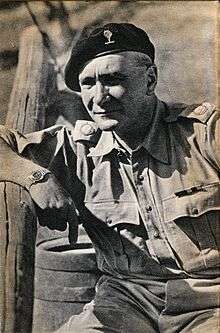Vladimir Peniakoff
| Vladimir Peniakoff | |
|---|---|
 | |
| Nickname(s) | Popski |
| Born |
30 March 1891 Huy, Belgium |
| Died |
15 May 1951 (aged 54) Bloomsbury, London, England |
| Buried at | Wixoe, Suffolk, England |
| Allegiance | United Kingdom |
| Service/branch |
French Army British Army |
| Years of service |
1917 - 1918 (France) 1940 - 1946 (UK) |
| Rank | Lieutenant-Colonel |
| Commands held | Popski's Private Army |
| Battles/wars |
First World War Second World War |
| Awards |
Distinguished Service Order Military Cross Croix de Guerre The Africa Star |
| Other work | Author |
Lieutenant-Colonel Vladimir Peniakoff DSO MC (Russian: Владимир Дмитриевич Пеняков Vladimir Dmitrievich Penyakov, 30 March 1897 – 15 May 1951), nicknamed Popski, was the founder and commanding officer of Popski's Private Army.
Early life
Vladimir Peniakoff was born in Belgium to Russian Jewish intellectual parents.[1] In 1914 he studied at St John's College, Cambridge and describes his early education in Popski's Private Army: "For years I never had less than three tutors who pumped knowledge into my precocious brain". Vladimir initially had conscientious objections to the Great War but by his fourth term at Cambridge he had changed his mind. Unlike many of his peers, he opted to join the French artillery as a private rather than go through the lengthy training that a commission in the British Army entailed. He was injured during his time in the French Army and was invalided out after the armistice.
In 1924 he emigrated to Egypt where he worked as an Engineer for a sugar manufacturer. During this time he learned to sail, fly and navigate vehicles through the desert, becoming a Fellow of the Royal Geographical Society. Vladimir Peniakoff was a polyglot who spoke English, Russian, Italian, German, French and Arabic well.
Second World War service
He was commissioned as a second lieutenant on the British Army General List on 4 October 1940,[2] serving in the Libyan Arab Force.
He was awarded the Military Cross on 26 November 1942,[3] and on 26 April 1945 he was appointed a Companion of the Distinguished Service Order (DSO).[4] In 1947 Popski was made a Belgian Officier de l'Ordre de la Couronne avec Palme and awarded the Belgian Croix de Guerre 1940 avec Palme.
Personal life
In Egypt he married Josephe Ceysens and had two daughters, Olga and Anne, born in 1930 and 1932. After his commission, he divorced Josephe and sent the family to South Africa.
He married Pamela Firth on 2 April 1948 (she went on to marry T. S. Matthews, former editor of Time magazine, after Popski's death).
Death
Within a year after his best-selling book on Popski's Private Army was published he was diagnosed with a fatal brain tumour and died at the National Hospital for Neurology and Neurosurgery in London on 15 May 1951. Pamela Matthews died on 5 December 2005 and is buried beside Popski in Wixoe, Suffolk.
References
- ↑ Willett. Popski. Willett interviewed many of Popski's surviving Jewish relatives after the Second World War.
- ↑ The London Gazette: (Supplement) no. 35063. pp. 681–682. 31 January 1941. Retrieved 2008-04-24.
- ↑ The London Gazette: (Supplement) no. 35799. p. 5142. 24 November 1942. Retrieved 2008-04-24.
- ↑ The London Gazette: (Supplement) no. 37051. p. 2216. 24 April 1945. Retrieved 2008-04-24.
External links
- Friends of PPA online part of the PPA Memorial, Official Register of PPA Personnel, PPA Roll of Honour, PPA Awards, PPA War Establishments and other information.
- PPA Preservation Society personnel database, photos and information.
- Special Forces Roll of Honour awards, images and links for many units including PPA.
- Popski's Private Army a comprehensive synopsis of the PPA story, by Allen Parfitt.